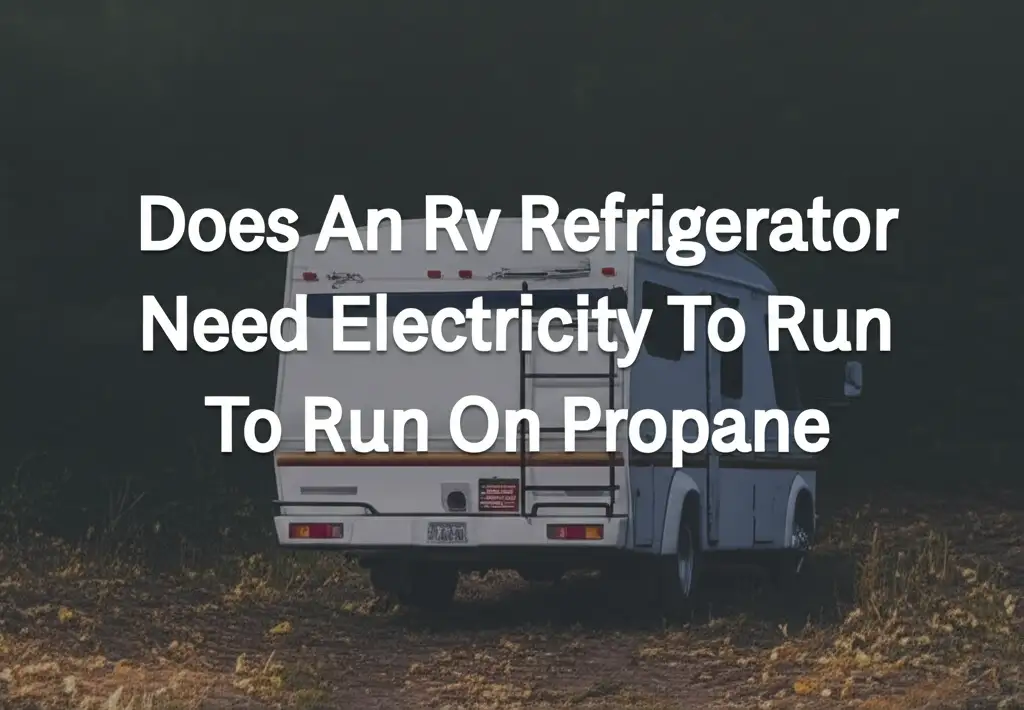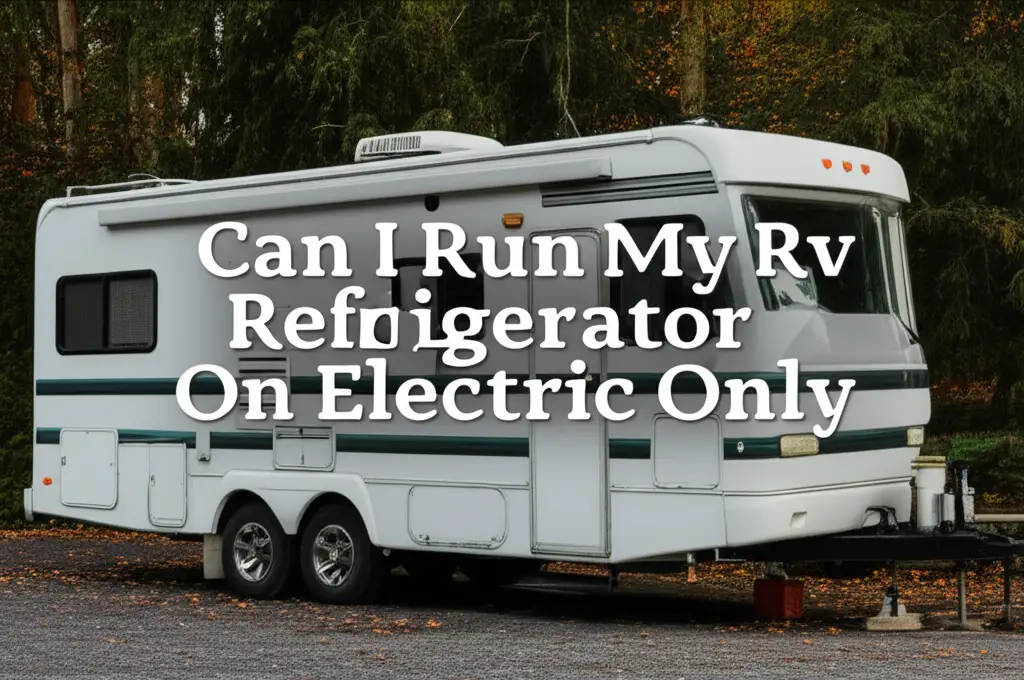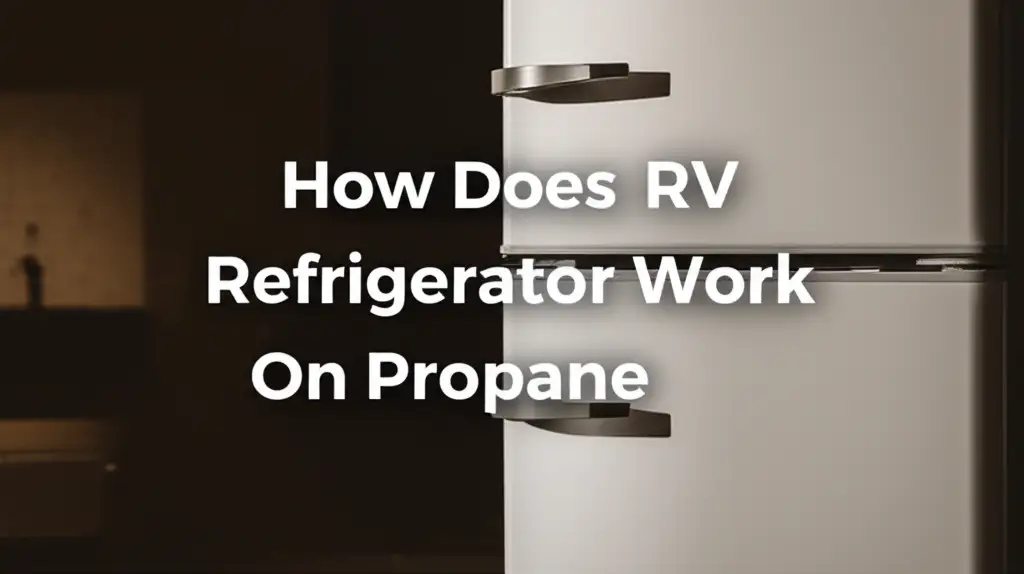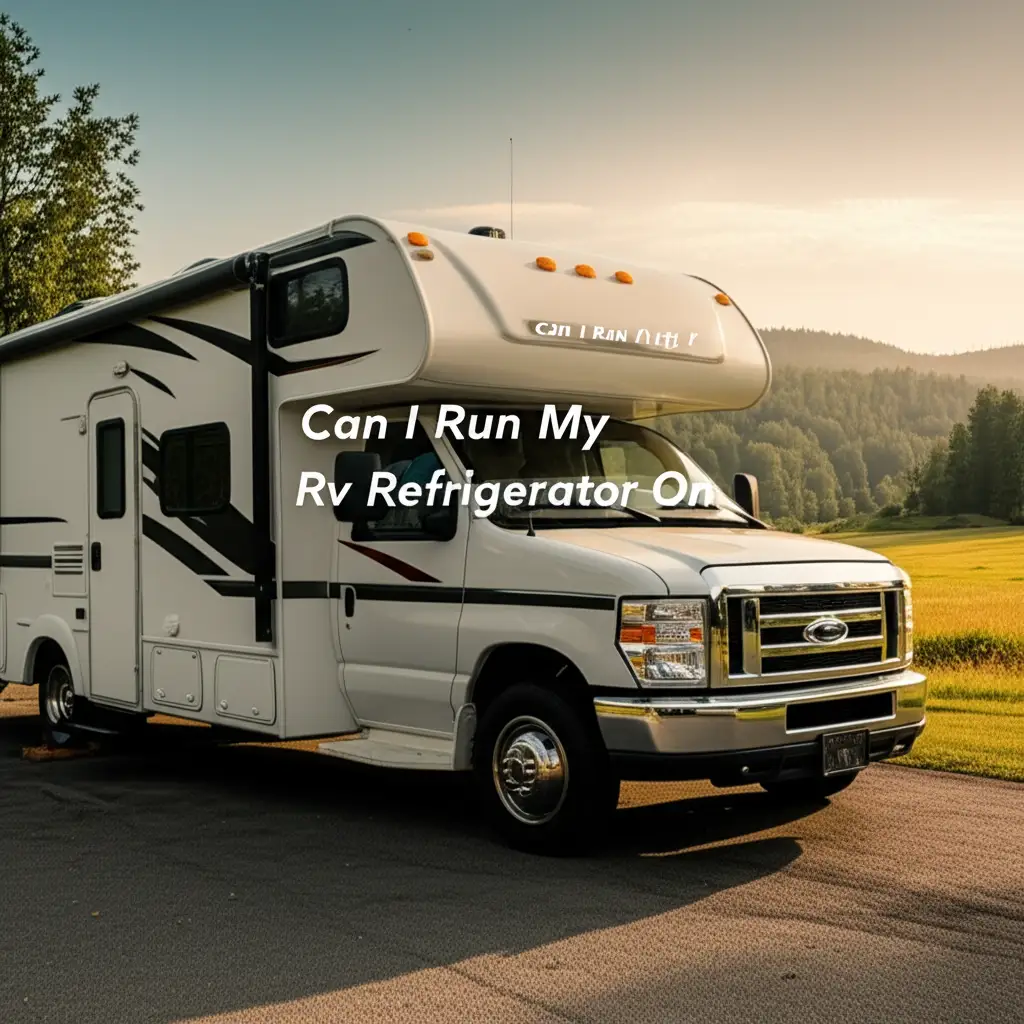· Todd Martin · RV Appliances · 19 min read
Does An Rv Refrigerator Need Electricity To Run On Propane

RV Refrigerator: Does it Need Electricity for Propane Operation?
Many RV adventurers wonder about their refrigerator’s power needs, especially when off-grid. A common question arises: “Does an RV refrigerator need electricity to run on propane?” This is a crucial point for boondockers and anyone planning extended trips away from shore power. Understanding how your RV fridge functions on propane will help you manage energy and enjoy your travels. I often see confusion about this topic among new RV owners. This article explains the exact relationship between propane and electricity in your RV refrigerator. We will cover the different types of RV fridges, their minimal electrical needs for propane mode, and how to keep your food cold reliably.
Takeaway
- Propane RV refrigerators require a small amount of 12V DC electricity. This power runs the control board, igniter, and interior lights.
- The propane flame itself creates the cooling effect. It provides the heat needed for the absorption cycle.
- Manage your 12V battery. Even minimal draw can deplete batteries over time, especially during extended boondocking.
- Consider solar or generators. These sources recharge your batteries, ensuring continuous fridge operation on propane.
The Direct Answer
Yes, an RV refrigerator does need a small amount of electricity to run on propane. This electricity, typically 12V DC, powers essential components. It operates the control board, igniter for the propane flame, and any interior lights or fans. The electricity does not create the cooling effect directly; the propane flame does that.
Understanding RV Refrigerators: Absorption vs. Compressor
RV refrigerators come in two primary types: absorption refrigerators and compressor (residential) refrigerators. Each type uses different methods to cool food. Knowing the difference helps you understand how your specific RV refrigerator operates. Most RVs, especially older models, feature absorption fridges. Newer or higher-end RVs might include compressor units.
Absorption refrigerators use a heat source to start a chemical reaction that creates cooling. This heat can come from an electric heating element or a propane flame. They do not have a compressor unit, which means they operate silently. This design makes them popular for off-grid camping because they can run on propane. An absorption fridge circulates a mixture of ammonia, water, and hydrogen gas to achieve refrigeration. The heat source warms the mixture, causing it to evaporate and then condense, removing heat from the fridge interior.
Compressor refrigerators work like your home refrigerator. They use a compressor to circulate a refrigerant gas, compressing and expanding it to create cold. These units primarily run on 120V AC household electricity. Some newer models can run on 12V DC power. Compressor fridges are generally more efficient at cooling and less sensitive to leveling. However, their electrical demands are much higher. This makes them less ideal for extended boondocking without a robust battery bank or consistent power input from solar or a generator. Most of this article focuses on the more common absorption RV refrigerator and its propane operation.
The Role of 12V Electricity in Propane Operation
While propane provides the main heat source for an absorption RV refrigerator, a small amount of 12V DC electricity is essential for its operation. This electricity is not used to create cold. Instead, it powers critical control and safety components. These components ensure the fridge starts correctly and functions safely. Without this minimal electrical supply, your RV refrigerator will not ignite or maintain its propane flame.
Here are the key components that require 12V electricity when running your RV refrigerator on propane:
- Control Board: This is the brain of your RV refrigerator. The control board manages all operations. It senses temperatures, controls the ignition sequence, and monitors safety features. The board requires constant 12V power to function.
- Igniter: When you switch the refrigerator to propane, the igniter creates a spark. This spark lights the propane gas flowing to the burner. It is similar to the igniter on a gas stove. Without 12V power, the igniter cannot produce the spark needed to start the flame.
- Propane Solenoid Valve: This valve controls the flow of propane gas to the burner. The control board sends a signal to this valve to open when propane operation is selected. It requires 12V power to open and close. This is a safety feature; if power is lost, the valve closes, shutting off the gas.
- Interior Light: Many RV refrigerators have an interior light that comes on when you open the door. This light uses 12V power. While not essential for cooling, it contributes to the overall electrical draw.
- Cooling Fans: Some RV refrigerators, especially larger units or those installed in warmer climates, have cooling fans. These fans help dissipate heat from the refrigerator’s coils. They improve efficiency by pulling air across the condenser fins. These fans also run on 12V power. If your RV refrigerator fan keeps running constantly, it could indicate a hot environment or a minor issue with the fan itself. This constant operation will increase your 12V power consumption.
Even though the electrical draw for these components is small, it is continuous. Over many hours or days, this small draw can slowly deplete your RV’s 12V battery bank. This is particularly important for those who enjoy boondocking or dry camping. Understanding these electrical needs helps you plan your power management. If you notice your RV refrigerator works on propane but not electric, it often points to a different issue with the electrical heating element or its circuit. You can find more information about that problem here: Why Does My RV Refrigerator Work on Propane But Not Electric.
How Propane Powers Your RV Fridge: The Absorption Cycle Explained
The core of an RV absorption refrigerator’s cooling process lies in its propane-fueled absorption cycle. This ingenious system produces cold without moving parts, relying on basic thermodynamics. It uses heat, not compression, to create a chilling effect. Understanding this cycle clarifies why propane is so effective for off-grid refrigeration.
Here is a simplified breakdown of how the absorption cycle works with propane:
- Heat Source (Propane Flame): The process begins with heat from a small propane flame. This flame heats a solution of ammonia and water in a generator tube. The generator is usually located at the back of the refrigerator.
- Boiling and Separation: As the ammonia-water solution heats up, the ammonia boils and turns into a gas. The water remains mostly liquid due to its higher boiling point. The ammonia gas then separates from the water.
- Condensation: The hot ammonia gas rises to the condenser coils, located at the top rear of the refrigerator. Air flowing over these coils cools the ammonia gas, causing it to condense back into a liquid form. This is an exothermic process, meaning it releases heat.
- Evaporation and Cooling: The liquid ammonia then flows into the evaporator coils inside the freezer and fresh food compartments. Here, it mixes with hydrogen gas. This mixture causes the liquid ammonia to evaporate rapidly. Evaporation is an endothermic process; it absorbs heat from its surroundings. This absorption of heat chills the interior of the refrigerator.
- Absorption and Return: The ammonia gas, now mixed with hydrogen, moves to the absorber section. Here, it is re-absorbed by the water, which has also circulated through the system. This re-absorption process separates the hydrogen gas. The ammonia-water solution then flows back to the generator, ready to restart the cycle.
This continuous loop of heating, evaporating, condensing, and absorbing is what keeps your RV refrigerator cold. The propane flame provides the initial energy to drive this cycle. Because the system relies on gravity and pressure differences, proper leveling of the RV is crucial for optimal performance. If the RV is significantly off-level, the liquids and gases may not flow correctly. This can hinder the cooling process. For more details on why your RV refrigerator needs to be level, you can read this article: Does An RV Refrigerator Have To Be Level To Work.
Battery Drain Concerns: Managing 12V Power for Propane Refrigeration
While the electrical draw for an RV refrigerator running on propane is minimal, it is still a continuous draw on your 12V DC battery bank. For RVers who enjoy boondocking or dry camping, managing this power consumption is critical. Over time, even small draws can completely deplete your batteries, leaving you without necessary 12V power for other systems. This includes lights, water pump, and furnace fan.
A typical RV absorption refrigerator might draw between 0.5 to 1.5 amps of 12V power when operating on propane. This draw powers the control board, igniter, and any internal fans. While seemingly small, consider the cumulative effect:
- 0.5 Amps x 24 hours = 12 Amp-hours per day
- 1.5 Amps x 24 hours = 36 Amp-hours per day
Most RVs come with one or two 12V deep-cycle batteries, which might offer a usable capacity of 50-100 amp-hours. If your refrigerator alone draws 25-30 amp-hours per day, your batteries could be depleted in just 2-4 days without any recharging. This calculation assumes no other electrical loads in your RV.
To effectively manage this battery drain, consider these strategies:
- Monitor Battery Levels: Regularly check your battery monitor. This helps you understand your power consumption and remaining capacity. A good monitor provides accurate readings.
- Minimize Door Openings: Each time you open the refrigerator door, cold air escapes. The fridge then works harder to cool down, potentially activating fans and increasing power draw. Plan your meal prep to reduce frequent door openings.
- Pre-cool Your Fridge: Before starting your trip, plug your RV into shore power. Let the refrigerator cool down completely for at least 12-24 hours. This prepares it for efficient operation on propane.
- Ensure Good Ventilation: The rear coils of your RV refrigerator need proper airflow to dissipate heat. Ensure the external vents are clear of obstructions. Poor ventilation can make the fridge work harder, increasing fan usage and power consumption.
- Invest in Solar Power: A solar panel system is an excellent solution for off-grid charging. Solar panels convert sunlight into electricity, replenishing your 12V batteries. This can provide continuous power for your refrigerator and other essential systems.
- Use a Generator: For cloudy days or higher power needs, a portable generator can quickly recharge your batteries. Run it for a few hours daily to top up your battery bank.
- Turn Off Interior Light: If your fridge light stays on or seems to consume too much power, ensure it turns off when the door closes. Some RVers even remove the bulb for extreme power saving, although this is usually not necessary for most situations.
- Inspect Wiring and Connections: Loose or corroded 12V connections can lead to voltage drops. This makes components work less efficiently or fail altogether. Ensure all wiring is clean and secure.
By implementing these strategies, you can significantly extend your boondocking adventures. You will ensure your RV refrigerator continues to run reliably on propane, keeping your food fresh.
Troubleshooting Common Propane Fridge Issues
Even with careful planning, your RV refrigerator might encounter issues when running on propane. Identifying common problems and knowing basic troubleshooting steps saves you time and frustration. Many problems relate to the propane supply, electrical components, or airflow. I have personally dealt with many of these issues on the road.
Here are some common problems and their solutions:
Refrigerator Not Cooling on Propane: This is perhaps the most common complaint.
- Check Propane Supply: Ensure your propane tank is open and has gas. Check that other propane appliances (stove, water heater) are working. If they are not, the tank might be empty or the main valve closed.
- Bleed Air from Lines: If you just refilled your tank or opened the valves, there might be air in the propane lines. Light a stove burner for a minute or two to purge the air.
- Verify Flame: Go to the exterior access panel for your refrigerator. You should see a small blue flame when the fridge is trying to operate on propane. If there’s no flame or it’s orange/yellow, there’s an issue.
- Check Burner Tube and Orifice: Spiders or debris can clog the burner tube or orifice. This restricts propane flow. Carefully clean them using compressed air or a soft brush. Do not use anything hard like a wire, as it can damage the orifice.
- Inspect Thermocouple/Thermistor: The thermocouple senses the flame. If it’s dirty or faulty, the fridge might not sense ignition and shut off the gas as a safety measure. The thermistor monitors the fridge temperature. A faulty thermistor can cause cooling issues.
- Check Control Board: A malfunctioning control board can prevent the fridge from igniting or cooling. This often requires professional diagnosis.
- If your RV refrigerator is not getting cold but freezer is on propane, it usually points to a partial blockage in the cooling unit or insufficient heat.
Ignition Problems:
- No Spark: If you hear gas but no click or no flame, the igniter might be faulty or dirty. Clean the igniter electrode. Ensure it has a clear path to spark.
- Pilot Light Blows Out: Wind can blow out the flame, especially while driving. A burner shield can help. Also, check for strong drafts around the access panel.
- Control Board Issue: As mentioned, the control board initiates the ignition sequence. If it fails, the igniter won’t spark.
Excessive Fan Noise or Constant Running Fans:
- High Ambient Temperature: If it’s very hot outside, the refrigerator fans might run more frequently. This is normal.
- Blocked Ventilation: Ensure the external vents are clear. Dust, leaves, or even insect nests can block airflow. This makes the fans work harder.
- Faulty Fan Switch/Thermostat: Some fans are controlled by a thermostat. If the thermostat is faulty, the fan might run constantly or not at all.
- For more detailed information on cooling fans, you can refer to: Why Does My RV Refrigerator Fan Go On And Off.
Propane Lockout:
- If the refrigerator tries to ignite multiple times and fails, it might go into a “lockout” mode. This is a safety feature. Turn the refrigerator off, wait a minute, then turn it back on to reset it.
Always prioritize safety when working with propane. If you smell gas, turn off the propane supply immediately. Do not attempt repairs beyond your skill level. If you suspect a serious issue, consult a qualified RV technician. Regular maintenance, like cleaning the burner and flues, can prevent many common problems.
Maximizing Efficiency: Tips for RV Refrigerator Performance
Getting the most out of your RV refrigerator, especially when running on propane, requires some strategic effort. Optimal performance means your food stays colder, your propane lasts longer, and your 12V battery drain is minimized. I have learned these tips from years of RVing, and they make a big difference.
Here are key tips to maximize your RV refrigerator’s efficiency:
- Pre-cool Before Your Trip: Always pre-cool your RV refrigerator on shore power for 12-24 hours before loading it. A cold refrigerator works less hard to maintain temperature once you switch to propane. Place a few frozen water bottles inside during pre-cooling to aid the process.
- Proper Loading: Do not overpack your refrigerator. Air needs to circulate around items for efficient cooling. Leave some space between food items. Also, avoid placing hot items directly into the fridge; let them cool down first.
- Maintain Levelness: Absorption refrigerators rely on gravity for the refrigerant to flow correctly. Ensure your RV is as level as possible when parked for extended periods. Even a slight tilt can reduce efficiency or cause the cooling unit to stop working. If your RV refrigerator is not getting cold but freezer is, improper leveling could be a contributing factor.
- Seal Door Gaskets: Check your door gaskets regularly for cracks or gaps. A poor seal allows cold air to escape and warm air to enter. You can test the seal by closing the door on a piece of paper; if you can pull the paper out easily, the seal is weak. Replace faulty gaskets.
- Clean Exterior Vents and Coils: The cooling unit on the back of your RV refrigerator needs good airflow to dissipate heat. Periodically remove the exterior access panels and clean away dust, dirt, spiderwebs, and debris from the condenser coils and vents. Use a soft brush or vacuum. Blocked vents significantly reduce efficiency.
- Monitor Temperature: Use a separate RV refrigerator thermometer to monitor the internal temperature. This ensures your food is staying at safe levels (below 40°F for the fresh food compartment). Adjust the thermostat as needed.
- Limit Door Openings: Every time you open the door, warm air rushes in. Be mindful of how often you open the fridge. Plan ahead to grab multiple items at once.
- Defrost Regularly: Frost buildup on the freezer coils acts as an insulator, reducing cooling efficiency. Defrost your freezer when frost buildup becomes significant (about ¼ inch thick). This allows the system to work more effectively.
- Consider a Fan Kit: Aftermarket fan kits can be installed inside the refrigerator compartment or behind the exterior coils. These fans improve air circulation and heat dissipation. This can significantly boost cooling performance, especially in hot weather. They do consume a small amount of 12V power.
By consistently applying these tips, you can ensure your RV refrigerator runs at its peak performance. This will save you propane, conserve battery life, and keep your food safely chilled on all your adventures.
Boondocking and Off-Grid Living: Powering Your RV Fridge
Boondocking, or dry camping, means you are operating without external hookups for electricity, water, or sewer. In this setting, your RV refrigerator’s ability to run primarily on propane becomes a significant advantage. This allows you to stay in remote, beautiful locations for extended periods. However, the small electrical draw required for propane operation still demands careful power management. You must ensure your 12V DC house batteries do not run flat.
Here is how you can effectively power your RV fridge and other essentials while boondocking:
Propane is Your Primary Fuel for Cooling: The beauty of absorption RV refrigerators is their efficiency with propane. A standard 30-pound (7-gallon) propane tank can power your RV refrigerator for weeks, depending on its size and ambient temperatures. This makes propane the hero for long-term food preservation off-grid. Always monitor your propane levels.
Manage Your 12V Battery Bank: Remember, even on propane, your fridge uses 12V power for its control board and igniter. This constant draw, combined with other essential 12V loads (lights, water pump, furnace fan, charging devices), can quickly deplete your batteries.
- Deep Cycle Batteries: Ensure you have healthy, properly sized deep cycle batteries. Lithium-ion (LiFePO4) batteries are an excellent upgrade. They offer more usable capacity and a longer lifespan than traditional lead-acid batteries.
- Battery Monitor: Install a precise battery monitor. It shows real-time power consumption and remaining battery capacity. This allows you to make informed decisions about your energy usage.
- Energy Conservation: Turn off lights when not needed. Use a minimal amount of water to reduce water pump usage. Consider LED lighting upgrades for lower power consumption.
Recharging Your Batteries Off-Grid:
- Solar Charging Systems: Solar panels are arguably the best long-term solution for boondocking. They silently convert sunlight into electricity, constantly topping off your batteries. The size of your solar array depends on your daily power consumption. A system large enough to offset your fridge’s 12V draw and other essentials is ideal. Integrate a solar charge controller to protect your batteries.
- Portable Generators: A quiet, portable generator is a versatile backup. You can run it for a few hours daily to quickly recharge your battery bank. Generators also power 120V AC appliances. Be mindful of noise regulations in campgrounds or boondocking areas.
- DC-to-DC Chargers: If you drive your RV frequently, a DC-to-DC charger connects to your vehicle’s alternator. It charges your house batteries efficiently while driving. This is a great way to replenish power between campsites.
- Wind Turbines: For specific environments, small wind turbines can provide another renewable charging option. They work well in windy locations where solar might be less effective.
By combining the low propane consumption of your RV refrigerator with smart 12V power management and reliable recharging methods, you can enjoy extended periods of comfortable off-grid living. Your RV fridge will stay cold, and your adventures will be limitless.
FAQ Section
Q1: How much 12V power does an RV fridge use on propane? An RV absorption refrigerator typically draws between 0.5 to 1.5 amps of 12V DC power when running on propane. This minimal draw powers the control board, igniter, and any interior lights or fans. While small, this continuous consumption can deplete your RV’s battery bank over several days if not recharged.
Q2: Can I run my RV fridge on propane while driving? Yes, most RV absorption refrigerators are designed to run on propane while driving. Modern RVs have safety features that shut off propane in case of an accident. Many RVers do this to keep food cold during travel. Ensure your propane tank valve is open. Also, turn off propane when fueling up at gas stations.
Q3: What if my RV fridge works on propane but not electric? If your RV fridge works on propane but not electric, it usually indicates an issue with the electrical heating element, its wiring, or the 120V AC power supply to the fridge. The cooling unit itself is likely fine since it works on propane. Check circuit breakers, fuses, and the heating element.
Q4: Why is my RV fridge not getting cold on propane? Common reasons for an RV fridge not cooling on propane include an empty propane tank, air in the gas lines, a clogged burner or orifice, a faulty igniter, or a malfunctioning control board. Ensure your RV is level. Check for a visible blue flame at the burner.
Q5: Do all RV refrigerators run on propane? No, not all RV refrigerators run on propane. Most traditional RVs use absorption refrigerators, which can run on both electricity (AC or DC) and propane. However, many newer RVs, especially those with residential-style fridges, use compressor-based refrigerators. These typically run only on 120V AC electricity, or sometimes on 12V DC power, but not on propane.
Conclusion
Understanding whether an RV refrigerator needs electricity to run on propane is key for every RV owner, especially for those who love boondocking. We have established that while propane fuels the core cooling process, a small, continuous supply of 12V DC electricity is essential. This power activates the control board, igniter, and other vital components. Without it, your absorption RV refrigerator cannot start or maintain its propane operation.
This small electrical draw impacts your battery life during off-grid adventures. However, with proper battery management, smart energy conservation, and efficient recharging methods like solar panels or generators, you can enjoy extended periods away from traditional hookups.
Knowing how your RV fridge functions on both propane and electricity empowers you to troubleshoot common issues and maximize its efficiency. By applying the tips discussed, you ensure your food stays cold and your adventures remain comfortable. Now that you know the ins and outs, go out and explore with confidence!
- RV refrigerator propane
- RV fridge electricity
- Absorption refrigerator
- Boondocking fridge
- RV power
- 12V power RV
- Propane operation RV





